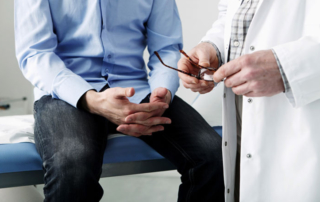What Causes Female Urinary Leakage
Urinary leakage, also known as incontinence, can feel embarrassing, but it’s a very common experience for women — during pregnancy, after giving birth, and as they age. According to Mitchell Goldenberg, MD, a urologist with USC Urology who sees patients at USC Verdugo Hills Hospital (USC-VHH) in Glendale, women often seek care for two types of incontinence: Urgency incontinence: when the bladder muscle squeezes when it’s not supposed to and gives patients a strong, sudden urge to urinate. Patients may feel the need to rush to the bathroom often or get up multiple times overnight. Stress incontinence: in which leakage
6 Tips to Prevent Sports Injuries in Children and Teens
Do you have active kids? Teach your young athlete how to avoid injury with these habits used by professionals. Organized sports are valuable opportunities for young people — they can teach teamwork, strategy and how good it feels to stay fit, while giving them an extra opportunity to play and make friends. Some sports can carry a risk of injury, and children and teens are especially vulnerable because their bodies are still growing. “Among young athletes, we see every type of sports injury, from ankle sprains to shoulder dislocations to concussions,” says Alexander Weber, MD, an orthopedic surgeon with
Breast Cancer Symptoms: What Should You Know?
Learn about the symptoms of breast cancer and what to look for to protect yourself against this disease.
Five Questions to Ask When Choosing an OB/GYN
Looking for a new OB/GYN? Evelyn Nicole Mitchell, MD, an obstetrician/gynecologist from USC Verdugo Hills Hospital, shares a few questions to ask before booking your first appointment. Choosing the right OB/GYN is one of the most sensitive decisions a patient can make. Evelyn Nicole Mitchell, MD, who practices obstetrics and gynecology at USC Verdugo Hills Hospital, will be among the first to tell you how crucial it is for an OB/GYN and their patient to have an open, mutually respectful relationship. “I believe communication is key,” Dr. Mitchell says. “It is important to be honest with each other regarding
In Charge of the Change
Menopause and perimenopause often come with disruptive symptoms due to fluctuating hormones. Evelyn Mitchell, MD, an OB/GYN at USC Verdugo Hills Hospital, breaks down 3 common physical symptoms — and what can be done to make life easier. 1. Hot flashes “A hot flash is a sudden feeling of intense heat that rushes to the upper body and face,” Dr. Mitchell explains. “It may last a couple of seconds to minutes and may occur daily or a few times a month. Hot flashes at night can cause night sweats, which can impact sleep.” Many women recommend carrying a personal
Is There a Better Way To Treat Uterine Fibroids?
Uterine fibroid embolization is a minimally invasive procedure that is an alternative to surgery — but is it right for you? Uterine fibroids are extremely common, benign tumors in the uterus. For many women, they cause no symptoms at all and don’t need to be treated. But, if you’re among the 25% of women for whom fibroids cause symptoms, they can affect your health and quality of life. Uterine fibroids may cause heavy menstrual bleeding or bleeding between periods, to the point that you may become anemic or need a blood transfusion. If fibroids get too big, they may also
Your Body at 40, 50, 60 and 70
As we progress through adulthood, our bodies continue to change. Here is what to look out for — and how to stay healthy — from your 40s to your 70s. Your Body at 40 As you enter your 40s, you may find yourself dealing with some changes in your body. Knowing what’s in store can help you prepare for lifestyle changes to stay healthy and happy for decades to come. The number on the scale might start creeping up What to expect: Both men and women will probably notice it’s easier to gain weight as they move past 40.
Abdominal Pain Signals a Life-Threatening Condition for Former La Cañada Flintridge Mayor
Jonathan Curtis has a “type A” personality. So when he was hit with sudden, severe pain in his abdomen last October, he simply grabbed some antacids to settle his stomach and got back to work. Instead of improving, the pain got worse. Within a few hours, Jonathan was wheeled into the emergency room at USC Verdugo Hills Hospital (USC-VHH), where blood work and a CT scan showed that he had necrotizing pancreatitis. Pancreatitis occurs when the pancreas becomes inflamed and, while painful, it is usually resolved simply. Physicians administer fluids and pain medication and keep a watchful eye while
Are Your Loved Ones Due for a Prostate Screening?
No one wants to think about their friends or family members battling prostate cancer, but being prepared is the best way to protect their health. Early detection is a critical part of successful treatment, and it depends on regular screenings — especially for men with elevated risk. Too often, myths and misconceptions keep men from being proactive about prostate health. Knowing the truth behind these two myths will help you and your loved ones build the best defense against prostate cancer. Myth: Most men are not at risk Fact: Prostate cancer is common, but treatable Prostate cancer is the second-most
Is Dementia Preventable?
Experts say that one-third of the world's dementia cases could be prevented by managing lifestyle factors such as hearing loss, hypertension and depression. This remarkable fact was part of a report by the first Lancet Commission on Dementia Prevention and Care that was presented at the Alzheimer’s Association International Conference (AAIC) 2017 and published in The Lancet. The report also highlighted the beneficial effects of nonpharmacologic interventions such as social contact and exercise for people with dementia. “There’s been a great deal of focus on developing medicines to prevent dementia, including Alzheimer’s disease,” said commission member and AAIC presenter Dr.










